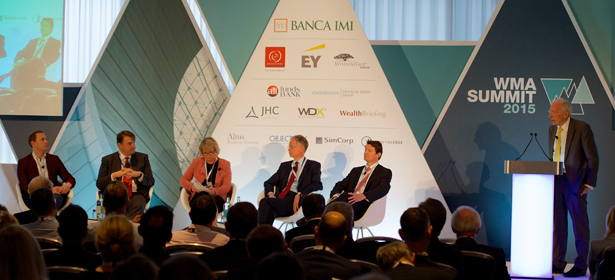Technology integral to future of wealth management

Nick Hungerford, Nutmeg
Private banks must improve their digital offerings but human advisers have a role to play too
The impact of technology on the wealth management industry was the hot topic among speakers at the Wealth Management Association’s annual summit, held in London on 12 November.
“In general, our industry has been later than others in developing the uses of technology,” admitted Adam Seale, chief executive officer at Interactive Investor.
This has been changing with the rise of robo-advisers such as Betterment in the US, or the UK-based online investment service Nutmeg, but these new players will not replace the human adviser, said Tracey Reddings, managing director at JP Morgan International Private Bank. Rather the two will prove complementary to each other. “Clients are paying us for knowledge and advice, but they want to be able to get to their portfolios and understand what is going on 24/7,” she said. “But they also want to be able to talk to real humans that understand their needs and goals.”
In general, our industry has been later than others in developing the uses of technology
Ms Reddings painted an analogy with the medical world: “You go into a hospital today and machines can more accurately diagnose an illness and say what the correct course of treatment will be. But you ask a patient in that hospital and they will still want to talk to a doctor to verify and validate that diagnosis.”
Today’s clients may be demanding their private banks improve their online offerings and make greater use of technology, but tomorrow’s, who will have been brought up in a digital world, will know no other way of doing business.
“Your fifties are the top time for savings but also for inheritance,” said Paul Killik, senior partner at Killik & Co. “When millennials reach that age they will go online rather than turn to a manager for advice. The digital offering will be so advanced by then.”
The higher end of the market will be the area in which investors still seek advice, predicted Jonathan Wragg, chief executive at Investec Wealth & Investment. “In 20 or 30 years I firmly believe we will see there is a need for both types of service but the polarisation will be at the higher end, the top end of mass affluent. The world is a much more complex place than it was historically and there has never been a greater need for advice.”
Clients are demanding more real time access to their investments and more empowerment in looking after their money, said Stephen Ford, head of wealth and investment management at Brewin Dolphin. Technology can help with this, but should be seen as an “enabler” not a “solution”.
“If the proposition isn’t right then all the technology in the world isn’t going to help,” he claimed. “I firmly believe there is a role for the person, for advice, we just need to deliver it in a much more convenient way for the customer.”
Digital managers are also having to evolve. When Nutmeg was launched, the objective was to change the front end of the model, to move from face to face sales to an online sales model, said its director and chief executive Nick Hungerford. “But this industry isn’t just reliant on a fancy website or face to face contacts. However you sell the products, you still have to have a great infrastructure behind you. I would say the biggest thing we have learned over the past 24 months is that the building of our infrastructure has had to take far greater precedence to cope with the scale and the volume that we have.”
He explained how Nutmeg took the decision to move their back office from a recognised outsourced provider, to running it in-house using the Babel System to gain greater flexibility and efficiency.
But online investment services, and the financial world in general, would do well to pay attention to a recent piece of research that Nutmeg carried out, and what it might mean for the future.
“We did a survey among millennials asking them if they would invest through a financial services company and about 41 per cent said they would,” explained Mr Hungerford. “When we asked if they would invest with Apple or Google about 61 per cent said they would. That for me is a scary piece of data.”






